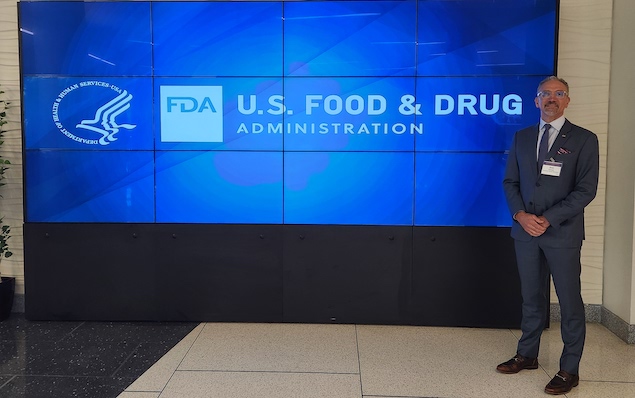ADA president tells FDA fluoride supplements are safe, effective
Brett Kessler, D.D.S., fluoridation leaders speak at fact finding meeting

The Food and Drug Administration held a hybrid public meeting to gather input on the clinical use and safety concerns associated with orally ingestible unapproved prescription drug products containing fluoride in the pediatric population. ADA President Brett Kessler, D.D.S., shared remarks during the public comment section of the meeting, while several ADA National Fluoridation Advisory Committee members spoke on panels.
The meeting, which was held July 23 in cooperation with the Reagan-Udall Foundation, featured sessions about the scope of use and identifying safety concerns and potential risks associated with orally ingestible unapproved products containing fluoride. It also included public comment on four topics: clinical use and prescribing considerations for pediatric tooth decay prevention; safety concerns; appropriateness of pediatric use considering additional sources of exposure; and the impact of removal of orally ingestible unapproved prescription drug products and potential alternatives.
George Tidmarsh, Ph.D., director of the FDA’s center for drug evaluation and research, shared his thoughts early in the meeting. He critiqued the first two presenters — both of which were in favor of fluoride supplements — for their lack of data.
“Our job at FDA is to balance risk and benefit, and every day we have to make that balance. It’s frequently a challenge, not always, but nothing is without risk, and you have to make sure that if there is risk, there’s a clear benefit. And that analysis needs to be done with data,” Dr. Tidmarsh said.
Susan Fisher-Owens, M.D., a pediatrician and professor at the University of California San Francisco, shared support for fluoride supplements in her presentation, stating at the meeting that “good science” can change people’s minds and lives for the better.
“It would be easy to believe this is a foregone conclusion, given the announcement of removing supplements from the market came before the science was presented, and Tidmarsh stated his opinion after only the first round. Still, I hope, for my patients’ sake, that the presentations emphasizing safety at levels as seen in the U.S. will convince the FDA,” Dr. Fisher-Owens said.
Jayanth Kumar, D.D.S., former California state dental director and National Fluoridation Advisory Committee member, spoke at the meeting about the neurocognitive impacts of fluoride exposure in children and provided a review of National Academies and World Health Organization consensus report findings.
Fluoride exposure at the concentration used in community water fluoridation is not associated with lower IQ scores, he said. Additionally, Dr. Kumar emphasized that “uncritical acceptance” of fluoride-IQ studies has hindered methodological progress.
“We must acknowledge the major methodological limitations so that robust methods can be developed to test fluoride-IQ hypotheses,” Dr. Kumar said, adding that decision-makers must take these findings into consideration in proposing policies and that interventional studies should be used to investigate the fluoride-IQ hypothesis in populations with high fluoride exposure.
In his testimony, Dr. Kessler said that generally accepted evidence has not shown such products are harmful when used as indicated. He said the products are a vital option to help many patients maintain good oral health – especially those located in rural areas — and that recommendations of fluoride supplements are best made between the patient and their dentist.
Several others also spoke in support, including Scott Tomar, D.M.D., on the reactor panel; Purnima Kumar, Ph.D., on oral and gut microbiome; and James Bekker, D.M.D., on the scope of fluoride supplements.
Dr. Kessler addressed recent claims by anti-fluoridation advocates that fluoride lowers IQ scores, stating that this conclusion is a misrepresentation of a 2024 National Toxicology Program report about fluoride exposure and neurodevelopment and cognition. The agency’s own website states that the report does not prove a cause and effect, Dr. Kessler noted, and that many substances are healthy and beneficial when taken in smaller doses.
“I’m hoping we can all take a breath, filter out the noise, and not give in to the anti-fluoride hysteria that we’ve witnessed since community water fluoridation began over eight decades ago,” Dr. Kessler said. “Prescription-strength fluoride supplements are safe, but they are not for everyone; their use should remain a thoughtful decision made between a dentist and the patient. It should not be based on noise, but on generally accepted evidence applied responsibly for the public good.”



